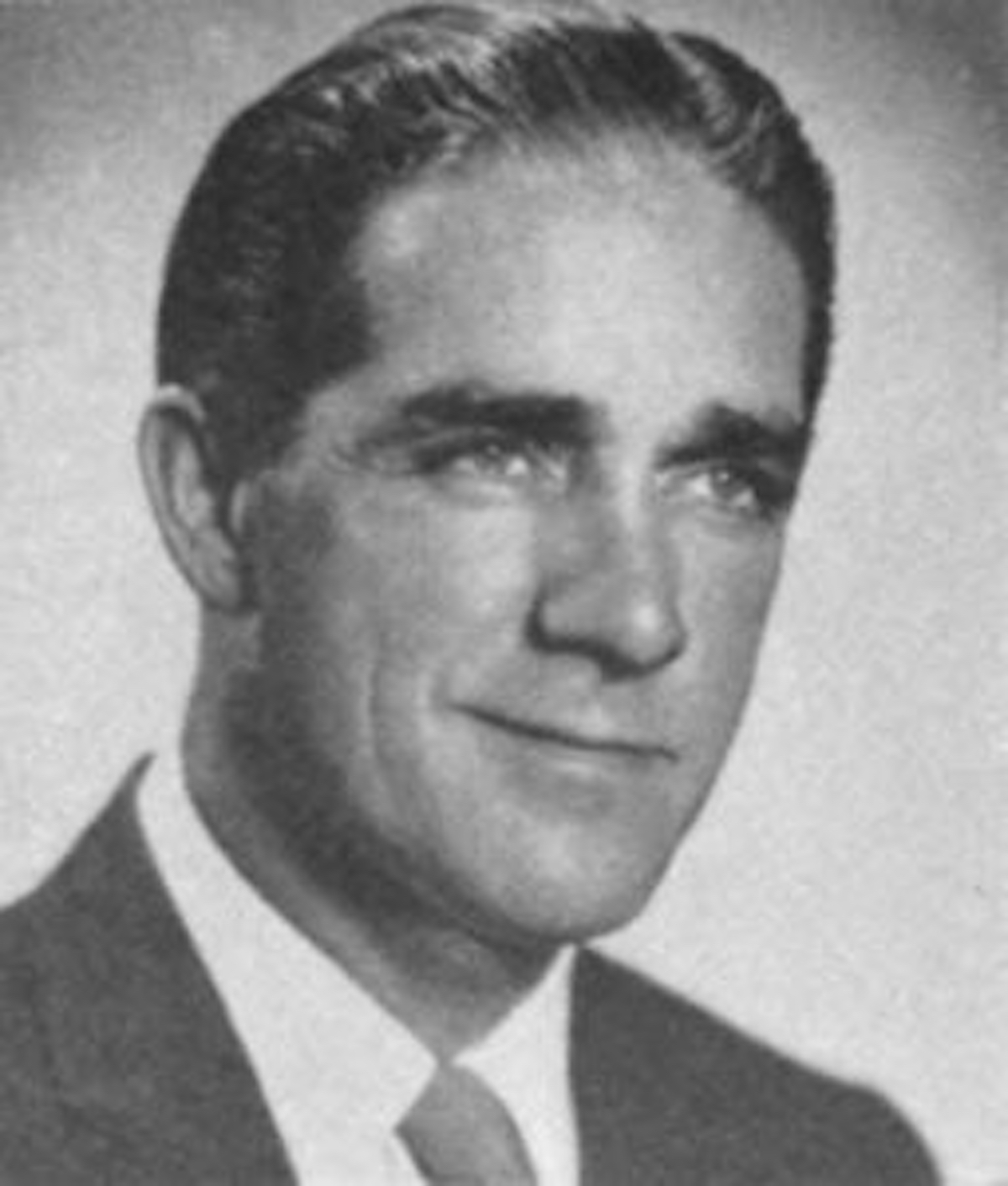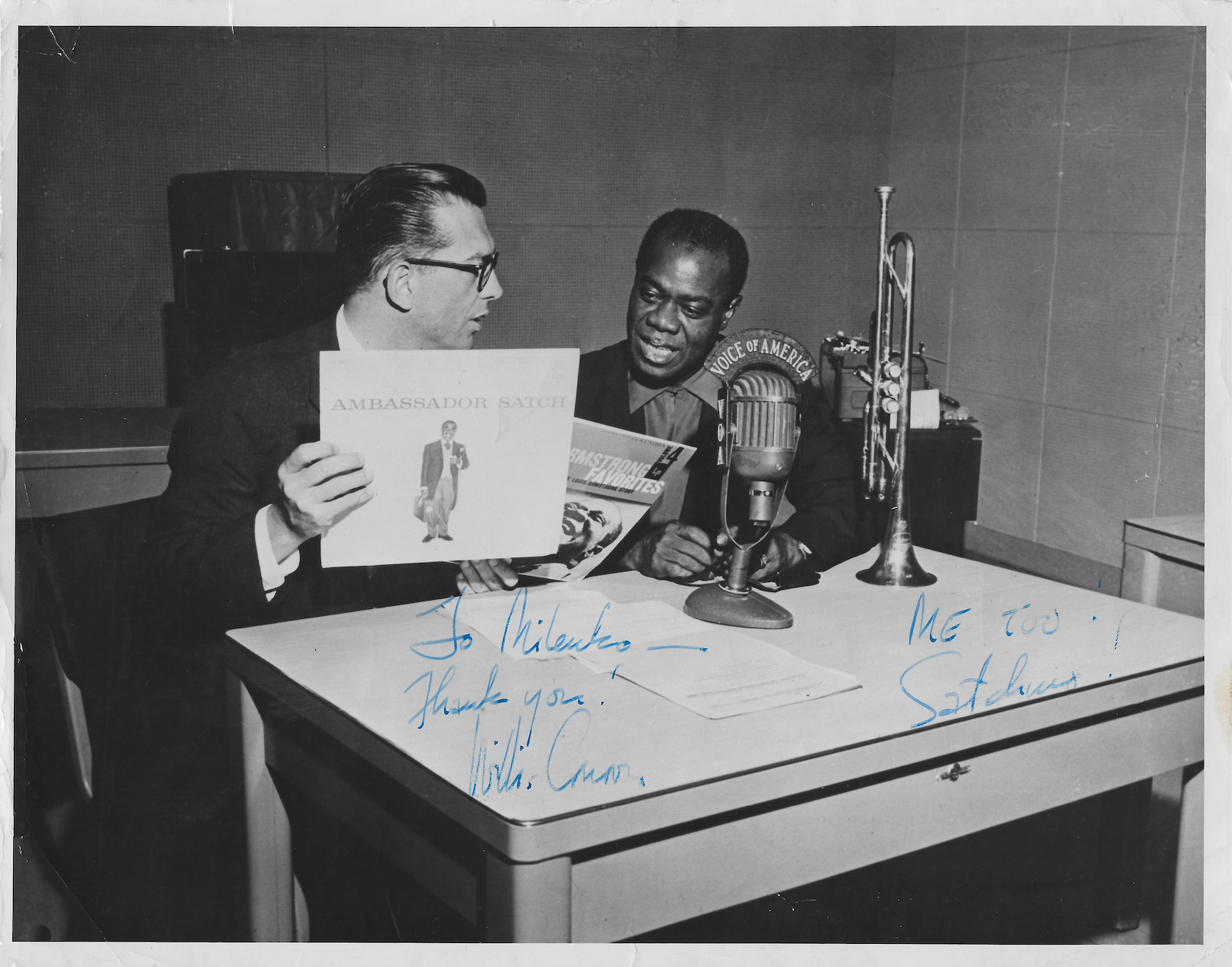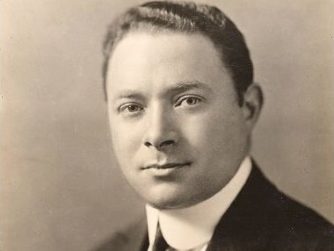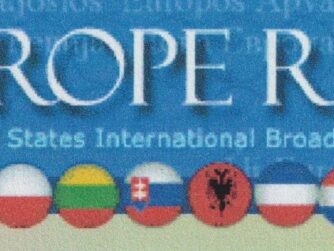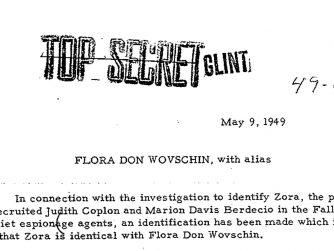![]() Cold War Radio Museum
Cold War Radio Museum
September 17, 2017
On April 13, 1943 Radio Berlin (Reichssender Berlin) broadcast official news of the German Nazi government that German military forces in the Katyn forest near Smolensk, in the then German-occupied region of the Soviet Union, had uncovered a ditch that was “28 metres long and 16 metres wide [92 ft by 52 ft], in which the bodies of 3,000 Polish officers were piled up in 12 layers”. The Germans blamed the murders on the Soviets. The Soviet government blamed it on the Germans — in this case, a blatantly false Soviet accusation designed to cover up the mass murders committed by the secret Soviet police NKVD on the orders of Stalin and the Politburo in April and May 1940.
The Soviet propaganda version of the Katyn Forest massacre was, however, accepted and promoted by the Roosevelt administration, including the Voice of America (VOA), despite evidence available to President Roosevelt and the Office of War Information (OWI) officials who were in charge of overseas VOA broadcasting and domestic U.S. government propaganda that the Soviets were the likely perpetrators of the mass murders. OWI officials, including its director Elmer Davis, repeated Soviet propaganda on Katyn overseas and in domestic broadcasts in the United States. OWI officials, including future U.S. Senator from California Alan Cranston, tried to intimidate and censor some American media outlets, most of them Polish American radio stations and newspapers, which attempted to report truthfully to Americans on the Soviet crime.
During April-May 1940, thousands of Polish prisoners of war in Soviet captivity were moved from their internment camps and taken to three execution sites, including the Katyn Forest. The total number of Polish POWs executed by the Soviets in the spring of 1940 is now estimated to be over 20,000. Those who died at Katyn included an admiral, two generals, 24 colonels, 79 lieutenant colonels, 258 majors, 654 captains, 17 naval captains, 3,420 NCOs, seven chaplains, three landowners, a prince, 43 officials, 85 privates, and 131 refugees. Also among the dead were 20 university professors, 300 physicians; several hundred lawyers, engineers, and teachers, and more than 100 writers and journalists, as well as about 200 pilots.[ref] Nataliya Lebedeva, “The Tragedy of Katyn,” International Affairs (Moscow), June 1990 and “The Katyn Controversy: Stalin’s Killing Field,” Studies in Intelligence. CIA (Winter), https://www.cia.gov/library/center-for-the-study-of-intelligence/csi-publications/csi-studies/studies/winter99-00/art6.html. Retrieved 13 April 2018.[/ref]
September 17, 1939 is the date of the invasion of eastern Poland by the Soviet Union under the secret provisions of the Molotov-Ribbentrop Pact, also know as the Hitler-Stalin Pact, which launched World War II on September 1, 1939. After Hitler betrayed Stalin and Soviet Russia eventually became a major military ally of the United States in the war with Nazi Germany, the Roosevelt administration used the Office of War Information, where radio programs of what would become known later as the Voice of America originated (during the war the VOA name was not yet officially used), to hide the origins of the German-Soviet attack on Poland in September 1939 and to help cover up Stalin’s crimes. Many members of the U.S. Congress, however, both during and immediately after World War II, kept warning about the secret collusion between the Roosevelt administration and the Soviet Union.
Close cooperation between Soviet and American government propagandists and employment of Soviet agents of influence at the wartime Voice of America helped to obscure the betrayal of U.S. allies and democratic values at the February 1945 Yalta Conference between President Franklin D. Roosevelt, Prime Minister Winston Churchill, and Soviet dictator Joseph Stalin. The betrayal was accompanied by the U.S. government’s pro-Russian propaganda and censorship of information to prevent Americans and foreign audiences from learning about the true nature of Soviet communism and Stalin’s intentions to subjugate Central and Eastern Europe. While protecting Stalin and Russia from criticism was excused by some during the war as dictated by military necessity, it was harder to excuse continuing coverup of Stalinist crimes in the post-war Voice of America broadcasts.
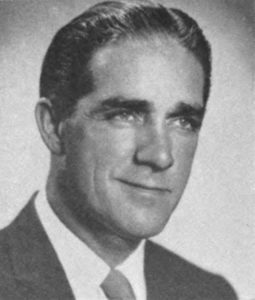 After the war, one of many members of the U.S. Congress who raised alarm about Soviet influence and censorship at the Voice of America was a U.S. Representative from Illinois (1951 to 1959) Timothy P. Sheehan. He was a Republican member of the bipartisan Select Committee of the House of Representatives which investigated the 1940 Soviet mass murder of Polish officers in the Katyn Forest near Smolensk, Russia. In a supplementary statement to the committee’s Final Report, Congressman Sheehan included a segment on “Propaganda Agencies.” The congressional investigation put a stop to most of VOA’s censorship of the Soviet responsibility for Katyn Forest Massacre in which more than 20,000 Polish military officers and government leaders were executed by the NKVD secret police.
After the war, one of many members of the U.S. Congress who raised alarm about Soviet influence and censorship at the Voice of America was a U.S. Representative from Illinois (1951 to 1959) Timothy P. Sheehan. He was a Republican member of the bipartisan Select Committee of the House of Representatives which investigated the 1940 Soviet mass murder of Polish officers in the Katyn Forest near Smolensk, Russia. In a supplementary statement to the committee’s Final Report, Congressman Sheehan included a segment on “Propaganda Agencies.” The congressional investigation put a stop to most of VOA’s censorship of the Soviet responsibility for Katyn Forest Massacre in which more than 20,000 Polish military officers and government leaders were executed by the NKVD secret police.
Timothy P. Sheehan, R-IL:
“Admittedly, during the Katyn investigation, we but scratched the surface on the part that the Office of War Information and the Voice of America took in following the administration line in suppressing the facts about the Katyn massacre. During the war there may have been a reasonable excuse for not broadcasting facts which were available in our State Department and Army Intelligence about the Katyn massacre and other facts which proved Russia’s failure to live up to her agreements. After the war there certainly was no excuse for not using in our propaganda war the truths which were in the files of our various Government departments.
One of the witnesses from the Department of State, which controls the policy of the Voice of America, stated that they did not broadcast the fact of Katyn behind the iron curtain was because they did not have sufficient facts on it. Yet the preponderance of evidence presented to our committee about the cover-up came from the files of the State Department itself.
The Voice of America, in its limited broadcasts about the Katyn massacre, followed a wishy-washy, spineless policy. From other information revealed about the policies followed by the Voice of America, a committee of the Congress ought to make a thorough investigation and see to it that the Voice pursues a firm and workable propaganda program and does not serve to cover up the mistakes of the State Department or the incumbent administration.”[ref]The Katyn Forest Massacre: Final Report of the Select Committee to Conduct an Investigation and Study of the Facts, Evidence, and Circumstances on the Katyn Massacre (Washington: United States Government Printing Office, 1952), p. 15.[/ref]
In a segment on “Misjudgment of Russia,” Congressman Sheehan also mentioned the role of the Voice of America in misleading not only foreign but also American public opinion. During World War II, many of the Office of War Information news and broadcasts were widely distributed to media in the United States. The U.S. Congress put a stop to domestic distribution of VOA programs by passing the 1948 Smith-Mundt Act. The Final Report of the so-called Madden Committee, named after U.S. Representative Ray J. Madden, D-IN, was issued on December 22, 1952.
Timothy P. Sheehan, R-IL:
“Roosevelt’s misjudgment that Russia would honor her agreements, in spite of the factual record of her past broken promises, has proven to be the major error in our entire foreign policy. In setting this policy, our Government, through the State Department, the Army Intelligence (G-2), the Office of War Information, and the Voice of America, followed the policy line so that the American people were misled. During the war the American public was led to believe that Russia was a loyal and trustworthy ally and after the war and until very recently, the executive department covered up the fact that they were so grossly mistaken about Russia.
To me, the reason why our Government suppressed the truth about the Katyn massacre was because this was but a small part of the giant error made in our foreign policy program. If our Government would have disclosed the truth about Katyn and the sellout of Poland, it would have had to disclose more truths about the perfidy of Russia. The American people would have then spoken in no uncertain terms and the Democrat administration did not want that to happen for very obvious reasons.”[ref]The Katyn Forest Massacre: Final Report of the Select Committee to Conduct an Investigation and Study of the Facts, Evidence, and Circumstances on the Katyn Massacre (Washington: United States Government Printing Office, 1952), pp. 14-15.[/ref]
Union Calendar No. 792
82d Congress, 2d Session- – – – – – – – – – – House Report No.2505
THE KATYN FOREST MASSACRE
FINAL REPORT
OF THE
SELECT COMMITTEE TO CONDUCT AN
INVESTIGATION AND STUDY OF THE FACTS,
EVIDENCE, AND CIRCUMSTANCES ON THE
KATYN FOREST MASSACRE
PURSUANT TO
H. Res. 390
AND
H. Res. 539
(82d Congress)
A RESOLUTION TO AUTHORIZE THE INVESTIGATION
OF THE MASS MURDER OF POLISH OFFICERS IN THE
KATYN FOREST NEAR SMOLENSK, RUSSIA
DECEMBER 22, 1952.—Committed to the Committee of the Whole House on
the State of the Union and ordered to be printed
UNITED STATES GOVERNMENT PRINTING OFFICE
WASHINGTON : 1952
SELECT COMMITTEE TO CONDUCT AN INVESTIGATION AND STUDY OF
THE FACTS, EVIDENCE, AND CIRCUMSTANCES OF THE KATYN FOREST
MASSACRE
RAY J. MADDEN, Indiana, Chairman
DANIEL J. FLOOD, Pennsylvania
FOSTER FURCOLO, Massachusetts
THADDEUS M. MACHROWICZ, Michigan
GEORGE A. DONDERO, Michigan
ALVIN E. O’KONSKI, Wisconsin
TIMOTHY P . SHEEHAN, Illinois
JOHN J. MITCHELL, Chief Counsel
ROMAN C. PUCINSKI, Chief Investigator
LUCILE S. BIEBIGHAUSEE, Secretary
[Page 9]OFFICE OF WAR INFORMATION, FEDERAL COMMUNICATIONS COMMISSION
When the Nazis, on April 13, 1943, announced to the world the finding of the mass graves of the Polish officers at Katyn and accused the Soviets, the Allies were stunned by this action and called it propaganda. Mr. Elmer Davis, news commentator, then head of the Office of War Information, an agency established by Executive order, told this committee he reported direct to the President. Under questioning he admitted frequent conferences with the State Department and other Government agencies. However, testifying before this committee, when faced with his own broadcast of May 3, 1943, in which he accused the Nazis of using the Katyn massacre as propaganda, he admitted under questioning that this broadcast was made on his own initiative.
This is another example of the failure to coordinate between Government agencies. A State Department memorandum dated April 22, 1943, which was read into the record (see vol. VII of the published hearings), stated:
and on the basis of the various conflicting contentions [concerning Katyn] of all parties concerned, it would appear to be advisable to refrain from taking any definite stand in regard to this question.
Mr. Davis, therefore, bears the responsibility for accepting the Soviet propaganda version of the Katyn massacre without full investigation. A very simple check with either Army Intelligence (G- 2) or the State Department would have revealed that the Katyn massacre issue was extremely controversial.
Furthermore, members of the staff of both OWI and FCC did engage in activities beyond the scope of their responsibilities. This unusual activity of silencing radio commentators first came to light in August 1943 when the House committee investigating the National Communications Commission discovered the procedure.
The technique utilized by staff members of OWI and FCC to silence was as follows: Polish radio commentators in Detroit and Buffalo broadcasting in foreign languages after the announcement of
[Page 10]the discovery of the mass graves of Polish officers at Katyn reported facts indicating that the Soviets might be guilty of this massacre.
In May 1943 a member of the FCC staff suggested to a member of the OWI staff that the only way to prevent these comments was to contact the Wartime Foreign Language Radio Control Committee. This committee was made up of station owners and managers who were endeavoring to cooperate with the OWI and FCC during the war years. Accordingly a meeting was arranged in New York with two of the members of this industry committee. They were specifically requested by the OWI staff member to arrange to have a Polish radio commentator in Detroit restrict his comments to straight news items concerning Katyn, and only those by the standard wire services. The fact that a member of the FCC staff attended this meeting is significant because the FCC in such a case had no jurisdiction. In fact, the FCC member was in New York to discuss the renewal of the radio license of one of these industry members. The owner of the radio station in Detroit was contacted and requested to restrict the comments of the Polish commentator on his station, and this was done.
By applying indirect pressure on the station owner, these staff members accomplished their purpose, namely, keeping the full facts of the Katyn massacre story from the American people. (See vol. VII of the published hearings.)
Office of Censorship officials testified and supported the conclusion of this committee that the OWI and FCC officials acted beyond the scope of their official Government responsibilities on this matter of Katyn. Testimony before this committee likewise proves that the Voice of America—successor to the Office of War Information—had failed to fully utilize available information concerning the Katyn massacre until the creation of this committee in 1951. The committee was not impressed with statements that publication of facts concerning this crime, prior to 1951, would lead to an ill-fated uprising in Poland. Neither was it convinced by the statements of OWI officials that for the Polish-Americans to hear or read about the Katyn massacre in 1943 would have resulted in a lessening of their cooperation in the Allied war effort.
MR. JUSTICE JACKSON
Mr. Justice Jackson appeared before this committee and advised that he had received no instructions or information concerning the Katyn massacre. When asked to explain how the Katyn affair happened to come on the agenda of the Nuremberg trials under the indictment of Herman Goering, he stated that the Soviets were responsible for drawing indictments on war crimes committed in eastern Europe. Mr. Justice Jackson stated as follows:
To the United States was allocated the over-all conspiracy to incite and wage a war of aggression. The British were assigned the violation of specific treaties and crimes on the high seas. Violations of the laws of war and crimes against humanity were divided on a geographical basis. The French undertook crimes in western Europe, and the
[Page 11]Soviet prosecution was assigned the duty of preparing and presenting evidence of crimes in eastern European area largely in Soviet occupation, and to much of which the others of us had no access. The geographical area thus as- signed to the Soviet representatives included Katyn wood and Poland as well, but at that time it was not known that the Katyn massacre would be involved.
When asked by the committee if he had received the various reports then in the files of the State Department and Army Intelligence (G-2), Mr. Justice Jackson testified that he had not. When asked by the committee what he would have done if he had received these reports, he replied as follows:
Of course, any information would have been helpful. If we had had information of that kind, I cannot pass on whether this would have been adequate, but if we had had adequate information of Russian guilt, we would not have consented at all to have the charge against the Nazis. It would have strengthened our hand in keeping it out immensely and probably would have resulted in the Soviets not making the accusation.
Before this committee was formed, many allegations were made that Americans on Mr. Jackson’s staff at Nuremberg assisted the Soviets in the preparation of this case on Katyn against the Nazis. The committee desired to clarify this point and specifically asked Mr. Jackson this question, and he denied that any member of his staff participated in the preparation of the Katyn indictment. The committee viewed with interest Mr. Justice Jackson’s statement in his testimony which is as follows:
This history will show that, if it is now deemed possible to establish responsibility for the Katyn murders, nothing that was decided by the Nuremberg Tribunal or contended for by the American prosecution will stand in your way.
CONCLUSIONS
1. In submitting this final report to the House of Representatives, this committee has come to the conclusion that in those fateful days nearing the end of the Second World War there unfortunately existed in high governmental and military circles a strange psychosis that military necessity required the sacrifice of loyal allies and our own principles in order to keep Soviet Russia from making a separate peace with the Nazis. For reasons less clear to this committee, this psychosis continued even after the conclusion of the war. Most of the witnesses testified that had they known then what they now know about Soviet Russia, they probably would not have pursued the course they did. It is undoubtedly true that hindsight is much easier to follow than foresight, but it is equally true that much of the material which this committee unearthed was or could have been available to those responsible for our foreign policy as early as 1942. And, it is equally true that even before 1942 the Kremlin rulers gave much evidence of a menace of Soviet imperialism paving the way for world conquest. Through the disastrous failure to recognize
[Page 12]the danger signs which then existed and in following a policy of satisfying the Kremlin leaders, our Government unwittingly strengthened their hand and contributed to a situation which has grown to be a menace to the United States and the entire free world.
2. Our committee is sending a copy of this report, and volume 7 of the published hearings, to the Department of Defense for such action as may be proper with regard to General Bissell. We do so because of the fact that this committee believes that had the Van Vliet report been made immediately available to the Department of State and to the American public, the course of our governmental policy toward Soviet Russia might have been more realistic with more fortunate postwar results.
3. This committee believes that the wartime policies of Army Intelligence (G-2) during 1944-45 should undergo a thorough investigation. Testimony heard by the committee substantiates this belief, and if such an investigation is conducted another object lesson might be learned.
4. Our committee concludes that the staff members of the Office of War Information and Federal Communications Commission who participated in the program of silencing Polish radio commentators went beyond the scope of their duties as official Government representatives. Actually, they usurped the functions of the Office of Censorship and by indirect pressure accomplished domestic censor- ship which was not within the jurisdiction of either of these agencies.
5. This committee believes that if the Voice of America is to justify its existence it must utilize material made available more forcefully and effectively.
6. This committee began its investigation last year, and as the committee’s work progressed, information, documents, and evidence was submitted from all parts of the world. It was at this same time that reports reached the committee of similar atrocities and violations of international law being perpetrated in Korea. This committee noted the striking similarity between crimes committed against the Poles at Katyn and those being inflicted on American and other United Nation troops in Korea. Communist tactics being used in Korea are identical to those followed at Katyn. Thus this committee believes that Congress should undertake an immediate investigation of the Korean war atrocities in order that the evidence can be collected and the truth revealed to the American people and the free peoples of the world. This committee will return to Congress approximately $21,000 in surplus funds, and it is suggested that this money be made available by Congress for such an investigation.
RECOMMENDATIONS
The final report of the Select Committee Investigating the Katyn Forest Massacre hereby incorporates the recommendations contained in the interim report, filed on July 2, 1952 (H. Rept. No. 2430).
[Page 13]This committee unanimously recommends that the House of Representatives approve the committee’s findings and adopt a resolution:
1. Requesting the President of the United States to forward the testimony, evidence, and findings of this committee to the United States delegates at the United Nations;
2. Requesting further that the President of the United States issue instructions to the United States delegates to present the Katyn case to the General Assembly of the United Nations;
3. Requesting that appropriate steps be taken by the General Assembly to seek action before the International World Court of Justice against the Union of Soviet Socialist Republics for committing a crime at Katyn which was in violation of the general principles of law recognized by civilized nations;
4. Requesting the President of the United States to instruct the United States delegation to seek the establishment of an international commission which would investigate other mass murders and crimes against humanity.
RAY J. MADDEN, Chairman.
DANIEL J. FLOOD.
THADDEUS M. MACHROWICZ.
GEORGE A. DONDERO.
ALVIN E. O’KONSKI.
TIMOTHY P. SHEEHAN.
[Page 14]SUPPLEMENTARY STATEMENT BY MR. SHEEHAN
On November 22d I addressed a letter to the Honorable Ray J. Madden, chairman of our committee, listing my conclusions for the consideration of the Katyn Committee to be incorporated in the final report.
Most of these conclusions have been incorporated in the final report and I am happy to join with my colleagues in making this a unanimous report. However, it seems to me that there is need for further emphasis on several points covered in the report and I feel these points can be best emphasized by this addendum to the final report.
MISJUDGMENT OF RUSSIA
On page 3 of this final report the opening sentence under the heading “Second phase” read:
The Congress requested that our committee determine why certain reports and files concerning the Katyn massacre disappeared or were suppressed by departments of our Government.
From the disclosure of many hitherto secret documents and from the oral testimony of men like our former Ambassadors Standley and Harriman, Special Ambassador George Earle, the former Under Secretary of State Sumner Welles and others, the cover-up of the facts of the Katyn massacre and withholding them from the American people was but a part of the desire on the part of the Democrat administration to cover their basic and colossal error in their foreign policy judgment.
President Franklin D. Roosevelt, who Mr. Harriman stated set our foreign policy and was the final authority on all foreign policy decisions, thought that Russia would disintegrate immediately after the end of the war. When warned by various of his appointees that Russia would become a great menace, Mr. Roosevelt silenced these men and refused to heed their advice. Mr. Roosevelt kept committing our country to agreements with the Russians in spite of the fact, as Mr. Harriman stated, that—
* * * There were a series of misdeeds by the Russians, from our standpoint, beginning with the Ribbentrop treaty, that it (revelation of the Katyn massacre) would have contributed, I think, to further distrust of the Soviets.
Roosevelt’s misjudgment that Russia would honor her agreements, in spite of the factual record of her past broken promises, has proven to be the major error in our entire foreign policy. In setting this policy, our Government, through the State Department, the Army Intelligence (G-2), the Office of War Information,
[Page 15]and the Voice of America, followed the policy line so that the American people were misled. During the war the American public was led to believe that Russia was a loyal and trustworthy ally and after the war and until very recently, the executive department covered up the fact that they were so grossly mistaken about Russia.
To me, the reason why our Government suppressed the truth about the Katyn massacre was because this was but a small part of the giant error made in our foreign policy program. If our Government would have disclosed the truth about Katyn and the sellout of Poland, it would have had to disclose more truths about the perfidy of Russia. The American people would have then spoken in no uncertain terms and the Democrat administration did not want that to happen for very obvious reasons.
PROPAGANDA AGENCIES
Admittedly, during the Katyn investigation, we but scratched the surface on the part that the Office of War Information and the Voice of America took in following the administration line in suppressing the facts about the Katyn massacre. During the war there may have been a reasonable excuse for not broadcasting facts which were available in our State Department and Army Intelligence about the Katyn massacre and other facts which proved Russia’s failure to live up to her agreements. After the war there certainly was no excuse for not using in our propaganda war the truths which were in the files of our various Government departments.
One of the witnesses from the Department of State, which controls the policy of the Voice of America, stated that they did not broadcast the fact of Katyn behind the iron curtain was because they did not have sufficient facts on it. Yet the preponderance of evidence presented to our committee about the cover-up came from the files of the State Department itself.
The Voice of America, in its limited broadcasts about the Katyn massacre, followed a wishy-washy, spineless policy. From other in- formation revealed about the policies followed by the Voice of America, a committee of the Congress ought to make a thorough investigation and see to it that the Voice pursues a firm and workable propaganda program and does not serve to cover up the mistakes of the State Department or the incumbent administration.
ARMY INTELLIGENCE AGENCIES
The United States Congress should investigate the wartime and postwar operation of the Army Intelligence (G-2) and the Counter- intelligence Agency. In our search for the missing Van Vliet report in the Army Intelligence Agency, there was revealed a very serious lack of close liaison between the various Government agencies. There was revealed to the committee a definite pro-Soviet sympathy by certain people working for G-2 during the war. In early 1942 one of our military attaches connected with Intelligence recommended that counterintelligence measures be set up against the Russians; he was advised that he showed a Russian bias and did
[Page 16]not know what he was doing. Several men who were openly anti-Russian were soon transferred out of this department. Documents were missing from this department which tended to be contrary to Russian interests. It was pointed out to our committee in executive session that quite a number of employees in G-2 who were suspected of Communist or leftwing sympathies were transferred to the Counter-intelligence Agency. Just several months ago two German officials of an agency which is the equivalent of our Federal Bureau of Investigation refused to make use of our Counter-intelligence Agency because they stated the German division of this agency was infiltrated by the Communists.
Mr. Harriman in his testimony stated that on the “strong recommendation of our Chiefs of Staff every effort was made to get Russia to come into the war against Japan. The quick and complete collapse of Japan took everyone by surprise because we thought the American armies would be forced to land on the plains of Tokyo. Postwar revelations proved that Japan sought out Russian help about 6 months prior to the end of the war, pleading with Russia to act as a peace intermediary. The Joint Chiefs of Staff were undoubtedly following the advice of Army Intelligence agencies, which apparently were grossly mistaken.
Did Russian influence in our Army Intelligence contribute to this gross miscalculation of Japan’s fighting capabilities? If so, is this element still in Army Intelligence? For the peace and security of our country, some independent body, such as Congress, should investigate.
Mr. Alvin E. O’Konski concurs in the above statement of Mr. Sheehan.
[Page 17]SUPPLEMENTARY STATEMENT OF MESSRS.
MADDEN, FLOOD, AND MACHROWICZ
We have carefully examined the statement submitted by Mr. Sheehan. We believe that the final report adopted unanimously and signed by all the members of the committee adequately and fully explains all the matters contained in this addendum. We are therefore submitting no additional remarks.


